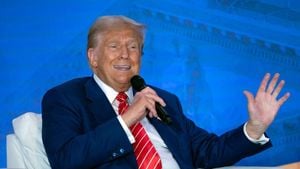Donald Trump has always possessed a knack for the dramatic, and his recent actions seem to heighten the sense of political theater surrounding him. Whether through social media outbursts or rallying his supporters, he injects urgency and unpredictability. This past week was no exception as he prepared for the upcoming trial related to his allegedly illegal attempts to overturn the 2020 election results.
With the trial date looming, Trump eagerly resurfaced on social media to criticize the proceedings, labeling them as "a witch hunt" and proclaiming himself as both victim and martyr. He often reframes events to cast himself as the underdog battling political elites, igniting fervent support from his base. This strategy resonates deeply, particularly among his devoted followers, who appreciate his blatant defiance against traditional political norms.
Many observers have noted how Trump capitalizes on media attention, turning legal challenges and political investigations to his advantage. His penchant for provocation has proven effective at maintaining relevancy and galvanizing support throughout his tumultuous political career. By playing the victim card, he not only distracts from the damaging allegations but also strengthens his position within the Republican Party, inspiring others to rally behind him.
This return to the public sphere also showcases Trump’s adeptness at exploiting current events. When news broke concerning his legal entanglements, he quickly orchestrated rallies, providing speaking platforms to echo his messages of rebellion against the established order. The combination of live audiences and social media affords him greater control over his narrative, ensuring his voice remains prominent even amid controversy.
Trump’s recent strategy appears to focus on mobilizing his core supporters, ensuring they perceive the threats against him as personal invasions of their rights. This method solidifies unfaltering loyalty but also raises questions about broader GOP dynamics. Some prominent Republicans express concerns about Trump’s capacity to rally their party amid such negative press, which could deter independents and swing voters.
Critics are concerned, too, about the long-term impact of Trump’s approach on the GOP’s image. While energizing the base is advantageous, cultivating broader support presents significant hurdles. A significant faction within the party fears Trump’s style could alienate moderate voters, hindering electoral success.
The upcoming trial is set to become a focal point for Trump’s strategy. Legal experts unpack how he potentially intends to utilize this moment to reinforce his narrative of oppression. By framing the trial as politically motivated, he breeds distrust among his supporters against the judicial system, casting it as another notch on the belt of government incompetence.
Yet, as the trial approaches, some vocal party members characterize Trump’s strategies as reckless. Committed Republicans argue for more prudent, policy-focused campaigning away from the personal drama. They believe addressing substantive issues could offer the best route toward victory rather than becoming ensnared in unceasing skirmishes.
How will this situation play out for Trump? The upcoming days promise to be rife with political tension, ensuring every twist becomes fodder for news cycles. Observers are already poised to see not only how Trump attacks the legal challenges before him but how he dances around the contentious themes of his administration, his policies, and what they mean for America's path moving forward.
On the campaign trail, candidates continually adapt their messages. Trump's nuanced game plan hinges on enticing his base, often resounding with nostalgic notions of what they perceive lost. He compounds this with continued assertions of victimization, transforming personal misfortunes and legal woes—like those surfacing from the trial—into red-hot points of rallying rhetoric.
This strategy reflects Trump's broader stylistic trademark: incendiary speeches brimming with bravado, bombast, and relentless criticism of adversaries. While this concoction might attract diehard supporters, concerns loom—will it gain traction with average voters who prioritize competency and unity?
At this crossroads, the Republican Party must reckon with its identity. Many wonder whether to stick with Trump’s brash tactics or pivot toward the center for widespread support. By espousing more moderate views, the party could potentially distance itself from the bristly image forged overnight by the former president.
Political analysts prepare for heated discussions surrounding party loyalty, future electoral strategies, and the extent to which Trumpian energy can persist. The narratives woven from this moment will likely echo through Republican ranks for years to come, as the party works to redefine itself amid ever-shifting public perceptions driven by Trump’s actions.
Recently, poll numbers indicate Trump retains strong support among the Republican base, illustrating the depth of loyalty he has cultivated through years of campaigning and crises. This hardiness poses significant challenges for opponents both within and outside the traditional GOP framework.
Looking forward, Trump's capacity to leverage dramatic situations may unearth both opportunities and perils. While presidential primaries and elections loom, he stands at the helm of potentiality, turning constraints to stepping stones, all the more until decisive moments reveal themselves amid political storms.
This dance of power and politics blended with Trump’s various antics is destined to mesmerize spectators, granting them front-row seats to witness how these political theatrics will shape the future of American politics.



